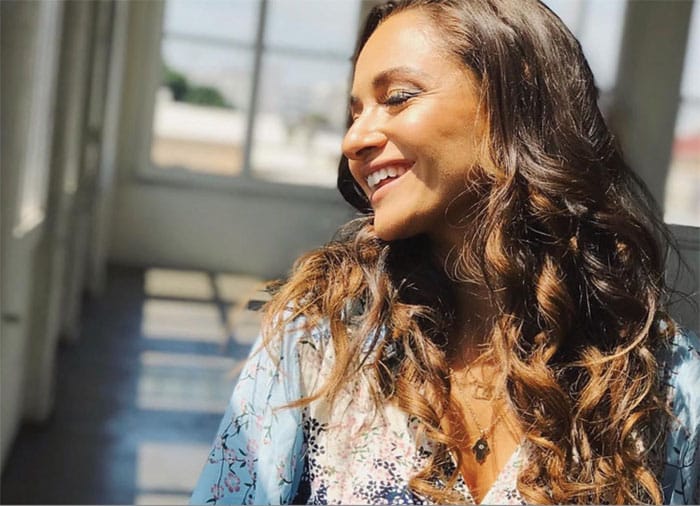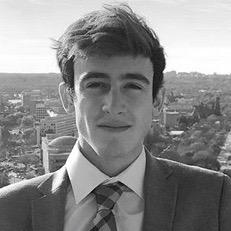 Photo from nicoleraviv.com
Photo from nicoleraviv.com On June 5th, 2021, Nicole Raviv stood before an audience of hundreds at the New York Islanders Stanley Cup playoffs. As she had done many times before, she began to sing the national anthem, only to discover her microphone was blown out due to technical difficulties. A true professional, she kept singing, and soon enough, the fans joined in with her. Raviv’s performance — the booming sound of thousands singing the Star-Spangled Banner —quickly went viral on sports-centered social media. Later, the performance was covered by The New York Post, The Daily Wire, Fox News, 12 News and Newsday.
“In that moment,” says Raviv, “It didn’t matter if you were a Republican or a Democrat. We were all here watching hockey. At the time, we were debating whether to sing the national anthem before sports games. But this was a moment of unity that changed the energy in the room. Of course, we were going to sing it.” The Islanders went on to win that game, and perhaps it was sports superstition that compelled the team management to ask Raviv to do the same thing at future games, to in some way get the audience belting “Oh say can you see…” along with her. Raviv began pointing her microphone toward the stands each time she sang. The audience kept joining in, and the Islanders kept winning.
The mainstream media spread Raviv’s name far and wide, and the Jewish journalism world quickly seized on the opportunity to highlight a display of heartwarming patriotism from a girl with an Israeli name who proudly wore a Hamsa necklace during her performances. The Jerusalem Post and Jewish Insider broke the news that America’s new sweetheart was in fact in the process of moving to Israel.
Raviv spent her childhood in Montreal, the daughter of Israeli parents who had immigrated before she was born, her mother the child of Holocaust survivors. “My parents met on stage — my dad sings and my mom acts, so performing is in my bloodline.” Raviv went on to study musical theater in college, and after years of attempting to “make it” as a vocal performer in New York City, she was brought on in 2019 as the national anthem singer for the New York Islanders. She dabbled in singing for the NBA, NFL, and soccer as well. “It was ironic that here I am, Canadian and Israeli, and I get my start in this world singing the American national anthem, but I guess that works,” she quips.
Raviv eventually decided to make aliyah because of her strong family connection to Israel. “I always knew, in the back of my head, that I would end up in Israel, I just didn’t know when,” she admits. As her career grew in New York, she was brought further and further into the Jewish community, making appearances at Israeli consulate events and high-profile events within the Jewish corporate world. This only strengthened her ever-present desire to return to the homeland. “In my late-twenties, my husband and I realized that if we didn’t do it now, it would be very unlikely that we would ever do it,” Raviv explains. “I felt like I had conquered New York, and Israel was the next level, a place where my musical spirit can truly thrive.”
Raviv believes that to improve her craft and to better connect with audiences, she must be in a place, in a region, in a culture, in a language that “makes her soul happy.”
Raviv believes that to improve her craft and to better connect with audiences, she must be in a place, in a region, in a culture, in a language that “makes her soul happy.” Throughout her time in New York, she was always attempting to add Middle Eastern influences into her music, which usually fell short due to lack of competent musicians and understanding of the style. In Israel, however, her creative expression can run wild. “I find that by singing in Hebrew, I’m able to emotionally connect more to my craft, something in me opens up when I sing in the language of my people.” Raviv will be performing in a new play at Habima Theatre in just a few weeks called “Ida,” which tells the story of Ida Nodel, a Soviet Zionist activist and refusenik, and is also in the process of crafting a new Hebrew musical about the life story of King David, which is set to run in Israel before it hits Broadway most likely next year. Just a few months into her new residency, she has even learned to sing in Arabic, a challenge she calls thrilling due to the beauty and mysticism of the Islamic world’s music.
Clearly, there were plenty of pull factors to Israel, but there were also push factors as well. Raviv noted how the environment in the United States is pressuring more Jews to move to Israel regardless of whether their soul is attached to the land or not.
Her performance at the 2021 Stanley Cup playoffs came on the heels of the previous May, when Israel erupted into a war with Hamas. “People at the time were taking their mezuzahs off their doors. My husband worked in the Diamond District where fireworks were thrown at Jews. I would go perform, and there were people, fellow Jews, working with me who told me not to wear my jewelry on camera . . . my Magen David or Hamsa. I told them no. If I have this platform, I am going to be loud and proud.” Jewish sports fans flooded Raviv with support for representing the tribe with confidence. The positive feedback only strengthened her resolve to live among Jews in a Jewish nation for the rest of her life.
Raviv and I later discussed why Jewish people in the arts continually shy away from standing, publicly, in solidarity with the Jewish people. This is in stark contrast to artists in the Black and LGBT communities, who tend to be unabashed in their support for causes and issues that concern their communities. During, for example, a war in Israel or during a wave of antisemitism in the United States, a majority of Jewish artists fall silent. “In the arts, there are certain social pressures to distance yourself from your Judaism just because of the environment you’re in and the opinions of your fellow artists,” she explains. “The arts can pressure you to put on a face or a fake persona to sustain a career.”
There is something special about Raviv’s story — of descending from victims of the Holocaust and making the move to Israel to succeed in the arts but having the pivotal moment of fame being an expression of American unity. It is often discussed that our society is too polarized, that it is on the cusp of tearing itself to shreds over conflicts of identity, which always pose a danger to Jews. That Raviv can bring an entire stadium together to honor national camaraderie while proudly wearing Judaism on her sleeve is a salute to the continued prosperity of both peoples: Americans and Jews. When America is strong, the Jews are strong.
Blake Flayton is New Media Director and columnist for the Jewish Journal.





















 More news and opinions than at a Shabbat dinner, right in your inbox.
More news and opinions than at a Shabbat dinner, right in your inbox.